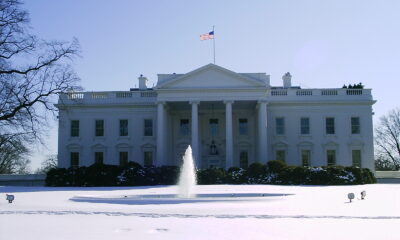Judicial
The New Jersey Supreme Court Disses George Washington
In August 2009, the Sussex County Tea Party Patriots sponsored a Committee to Recall Senator Robert Menendez and subsequently filed a notice to recall the Senator in accordance with NJ laws. After two court cases, including a unanimous decision by the Appellate Division in favor the Recall Committee and a NJ Supreme Court 4-2 decision in favor of Menendez, the Committee had intended to take this battle all the way up to the U.S. Supreme Court. However, the legal battle rendered the case moot because existing time constraints would not have allowed the recall to proceed regardless of the decision. While the legal battle may have been interesting, a possibly more important battle has slipped under the public radar screen.
When court cases like this, challenge the Constitution, judges usually place great importance on the intention of the founders. Many are familiar with Thomas Jefferson’s letter to the Danbury Baptists in Connecticut who were trying to establish a state religion. In that letter Jefferson stated that there was a “wall of separation between church and state.” Lawyers and judges often refer to this case and give it substantial weight in determining the intentions of our founders in church/state matters. But Jefferson wrote this letter ten years after the Constitutional Convention—and he was in France while the Convention took place.
Following this practice, you would think that a letter written by George Washington two months after the Constitutional Convention would carry greater weight than Jefferson’s letter written 10 years after the Convention, especially when one considers that Washington presided over the Constitutional Convention, which Jefferson did not attend. One would certainly think that the NJ Supreme Court would consider Washington to be one of our most illustrious founders. However, that doesn’t seem to be the case. The NJ Supreme Court’s majority opinion in the Menendez case stated:
…and many delegates at both the Constitutional Convention and the state ratifying conventions specifically highlighted that recall was not part of the proposed new Constitution. Some did so approvingly; others lamented that recall did not exist. None, however suggested that recall remained alive under the new constitutional form of government that was created. (emphasis added)
[amazon_carousel widget_type=”ASINList” width=”500″ height=”250″ title=”” market_place=”US” shuffle_products=”True” show_border=”False” asin=”B00375LOEG, 0451947673, 0800733940, 0062073303, 1595230734, 1936218003, 0981559662, 1935071874, 1932172378″ /]
In the above statement, the Court willfully dismissed George Washington’s letter wherein he states:
The power under the Constitution will always be in the people. It is entrusted for certain defined purposes, and for a certain limited period, to representatives of their own choosing; and whenever it is executed contrary to their interest, or not agreeable to their wishes, their servants can, and undoubtedly will, be recalled.
This quote is from a letter written by Washington to his nephew and heir, Bushrod, who had passed his bar exam when his uncle wrote to him. He would go on to become a US Supreme Court Justice. According to the letter, which the plaintiff/respondents submitted as part of the legal briefs and introduced at the hearing, Washington fully expected that recall was an option that the voters of this country would exercise. Not only did the Court refuse to consider this letter as representing the intentions of the founders at the time; in their decision they refused to acknowledge Washington’s contribution to the Constitutional Convention when they stated that “None of the delegates at the Convention suggested that recall remain alive under the new Constitution.” Their decision cannot be based on logic and impartiality, as is expected from our courts; it can only be based on political ideologies. In light of the NJ Supreme Court’s majority opinion, the issue of recall pales in comparison to the blatant disregard for jurisprudence that NJ courts exercise—a disregardso blatant that they would go as far as dismissing Washington as one of our country’s founders in order to justify their politically-motivated decision.
In 2010 the voters in this country paid much attention to the ideologies of the candidates, perhaps it is time that more attention is paid to the rogue justices that are subverting their state and US Constitutions and legislating from the bench based on personal worldviews rather than our rule of law.
RoseAnn Salanitri is a published author and Acquisition Editor for the New Jersey Family Policy Council. She is a community activist who has founded the Sussex County Tea Party in her home state and launched a recall movement against Senator Robert Menendez. RoseAnn is also the founder of Veritas Christian Academy, as well as co-founder of Creation Science Alive, and a national creation science speaker.
-

 Accountability3 days ago
Accountability3 days agoWaste of the Day: Principal Bought Lobster with School Funds
-

 Executive1 day ago
Executive1 day agoHow Relaxed COVID-Era Rules Fueled Minnesota’s Biggest Scam
-

 Civilization9 hours ago
Civilization9 hours agoWhy Europe Shouldn’t Be Upset at Trump’s Venezuelan Actions
-

 Constitution2 days ago
Constitution2 days agoTrump, Canada, and the Constitutional Problem Beneath the Bridge
-

 Civilization1 day ago
Civilization1 day agoThe End of Purple States and Competitive Districts
-

 Christianity Today9 hours ago
Christianity Today9 hours agoSurprising Revival: Gen Z Men & Highly Educated Lead Return to Religion
-

 Civilization5 days ago
Civilization5 days agoThe devil is in the details
-

 Executive21 hours ago
Executive21 hours agoWaste of the Day: Can You Hear Me Now?







